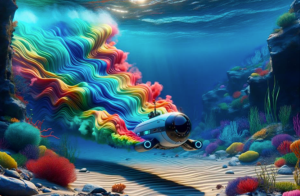Enhancing AUV Navigation with AI: A Breakthrough in Autonomous Underwater Vehicles
Oren Gal - Department of Marine Technologies
Aurele Itah# - Department of Marine Technologies
Artificial Intelligence
Data mining
Algorithms
Marine Science
Robotics
SEED Grant 2024

Did you know that by integrating Artificial Intelligence (AI) and Reinforcement Learning (RL) with fluid dynamics simulations, we can revolutionize the way Autonomous Underwater Vehicles (AUVs) navigate through complex and unpredictable underwater environments?
Our research is centered on enhancing the navigation of AUVs by combining advanced AI techniques with Computational Fluid Dynamics (CFD) predictions. AUVs play a crucial role in tasks like oceanographic data collection, pipeline inspections, and environmental monitoring, yet their efficiency is often hindered by unpredictable underwater currents. To address this, we developed a navigation algorithm that integrates RL for real-time path planning and obstacle avoidance, leveraging CFD to predict water flow patterns and forces affecting the AUV. The goal is to significantly improve the accuracy, energy efficiency, and adaptability of AUV operations, making them more reliable in dynamic underwater conditions.
The core of our research lies in the integration of RL and CFD. By conducting comprehensive CFD simulations, we predict the forces and pressures acting on an AUV as it navigates underwater. These predictions are then fed into an RL algorithm, enabling the AUV to make real-time adjustments to its path. We use MATLAB Simulink for modeling control systems and simulating dynamic responses. Our approach also involves testing this integrated system in both simulated environments and real-world sea trials, ensuring that our algorithm performs effectively under diverse conditions.
This research is being conducted under the supervision of Dr. Oren Gal at the Department of Marine Technologies, University of Haifa. Our team comprises a diverse group of researchers specializing in AI, marine technologies, and fluid dynamics. Each member brings unique expertise, from CFD modeling to AI-driven navigation strategies, which contributes to the innovative approaches being explored in this project.
Our research promises to significantly advance the field of AUV navigation, offering enhanced operational capabilities across a variety of marine applications. By integrating AI with CFD, our system allows AUVs to navigate with unprecedented precision and efficiency, reducing energy consumption and increasing mission success rates. This development opens new possibilities for underwater exploration, search and rescue missions, and scientific research, pushing the boundaries of what AUVs can achieve.
Publications:
Itah, A, Gal, O. “Advanced AUV Path Planning through Reinforcement Learning and CFD Predictions”, technical report. Journal paper is on process.

Did you know that by integrating Artificial Intelligence (AI) and Reinforcement Learning (RL) with fluid dynamics simulations, we can revolutionize the way Autonomous Underwater Vehicles (AUVs) navigate through complex and unpredictable underwater environments?
Our research is centered on enhancing the navigation of AUVs by combining advanced AI techniques with Computational Fluid Dynamics (CFD) predictions. AUVs play a crucial role in tasks like oceanographic data collection, pipeline inspections, and environmental monitoring, yet their efficiency is often hindered by unpredictable underwater currents. To address this, we developed a navigation algorithm that integrates RL for real-time path planning and obstacle avoidance, leveraging CFD to predict water flow patterns and forces affecting the AUV. The goal is to significantly improve the accuracy, energy efficiency, and adaptability of AUV operations, making them more reliable in dynamic underwater conditions.
The core of our research lies in the integration of RL and CFD. By conducting comprehensive CFD simulations, we predict the forces and pressures acting on an AUV as it navigates underwater. These predictions are then fed into an RL algorithm, enabling the AUV to make real-time adjustments to its path. We use MATLAB Simulink for modeling control systems and simulating dynamic responses. Our approach also involves testing this integrated system in both simulated environments and real-world sea trials, ensuring that our algorithm performs effectively under diverse conditions.
This research is being conducted under the supervision of Dr. Oren Gal at the Department of Marine Technologies, University of Haifa. Our team comprises a diverse group of researchers specializing in AI, marine technologies, and fluid dynamics. Each member brings unique expertise, from CFD modeling to AI-driven navigation strategies, which contributes to the innovative approaches being explored in this project.
Our research promises to significantly advance the field of AUV navigation, offering enhanced operational capabilities across a variety of marine applications. By integrating AI with CFD, our system allows AUVs to navigate with unprecedented precision and efficiency, reducing energy consumption and increasing mission success rates. This development opens new possibilities for underwater exploration, search and rescue missions, and scientific research, pushing the boundaries of what AUVs can achieve.
Publications:
Itah, A, Gal, O. “Advanced AUV Path Planning through Reinforcement Learning and CFD Predictions”, technical report. Journal paper is on process.

